Monika Karbowska
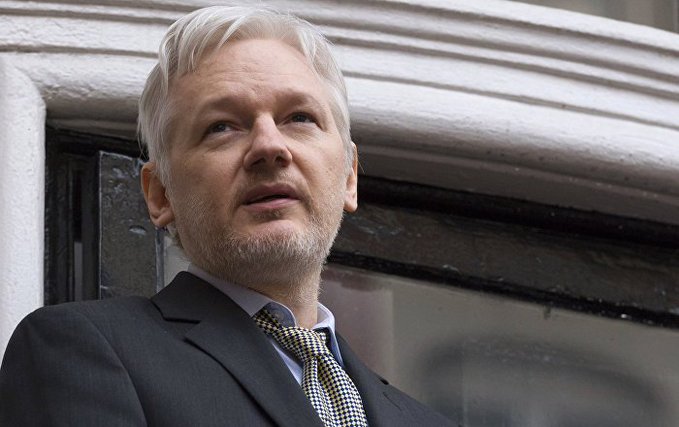
For the fifth time in two months I find myself in London on November 18th to attend a trial hearing of Julian Assange at the Westminster Magistrate Court. Since we understood that all hearings are important for the battle, there is no question of avoiding even the shortest one. It is crucial to report on what is happening there in order to avoid the false storytelling that can be spread by good or bad people in the absence of films and photos which are still banned in this public extradition trial. Our presence is all the more crucial as the Wikijustice association has just published and sent to the British courts, parliamentarians and media a « request for release », a ready-to-use request for the release of Julian Assange. A British lawyer or human rights association could, in the name of human rights above all procedures and interests of states, ask without delay for the release of an innocent man, the political prisoner Julian Assange. Indeed, the law gives the right to file this request to the judge every month that passes while the 28 days of his pre-trial detention from the hearing of 21 October to the present day of 18 November have elapsed. Gareth Peirce and Mark Summers, Julian Assange’s lawyers, could have directly copied our application written in English with the help of our French and European lawyers.
I doubt that they would do so but it is important to stress, in contrast to the physical and institutional violence I will experience, that on that day Julian Assange could legally have become a free man again.
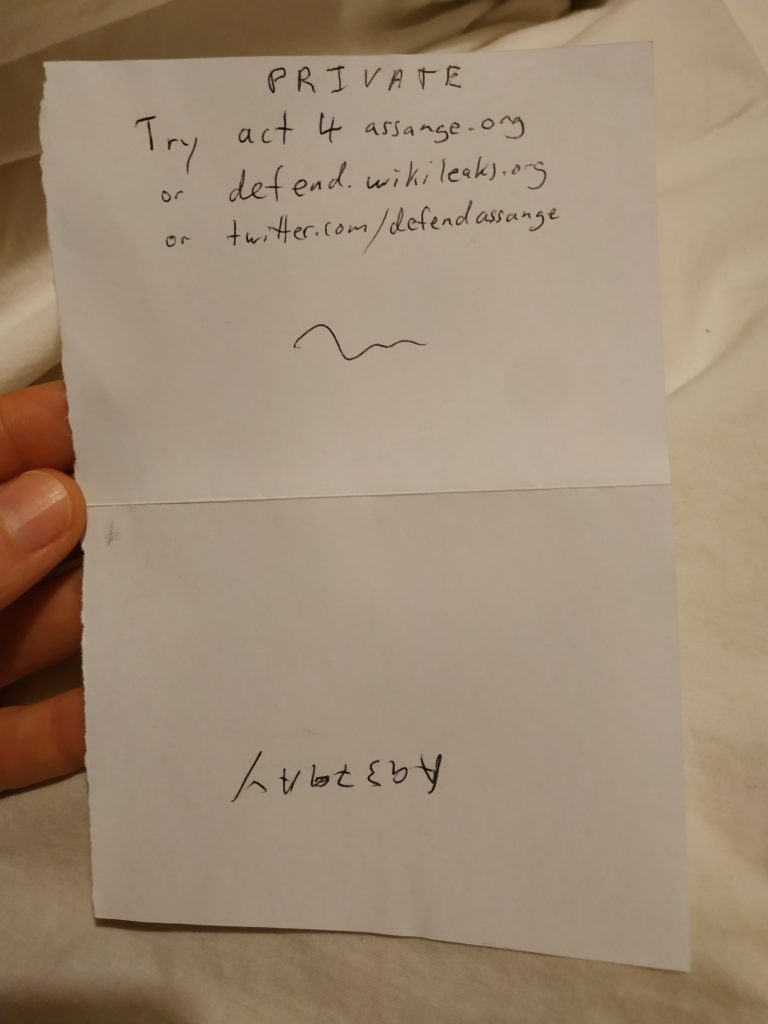
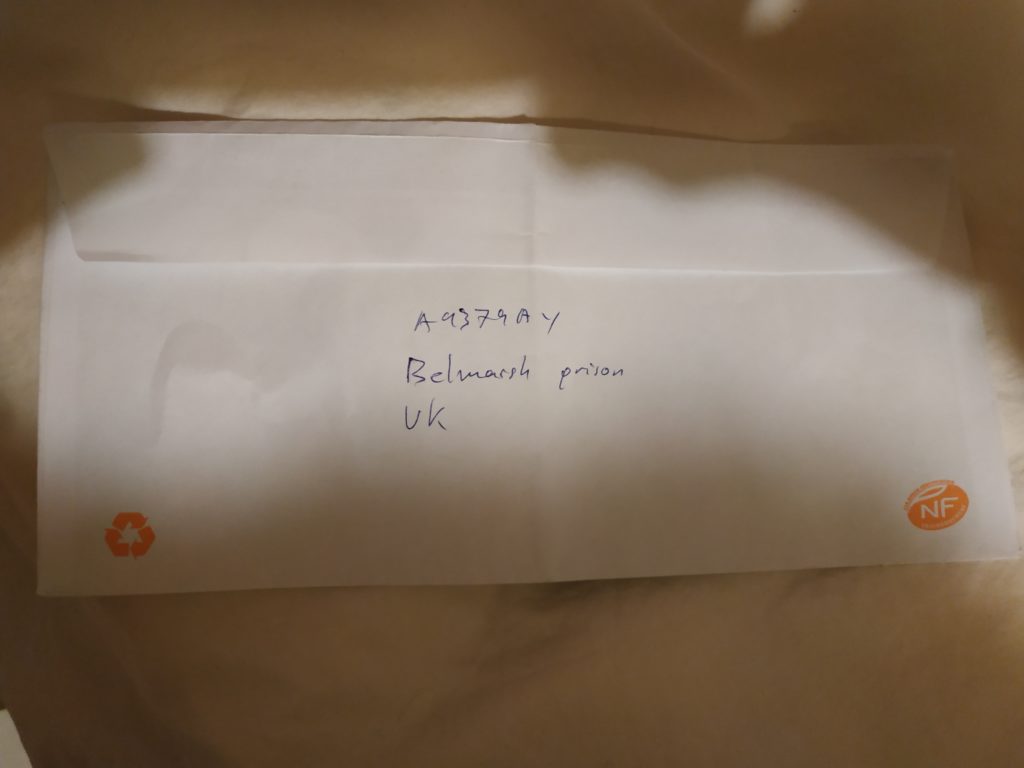
The news of the dismissal of Judge Emma Arbuthnot[1], whose conflict of interest in this case has been highlighted by some of the media, reaches me this morning like a balm to my heart as I stand in line with three friends from 6.30 to 9 a.m. outside the court door. It is important to arrive early to get a seat in room number 3, the experience of the October 21 grab fair has amply demonstrated this. We are the first when the front door of the building opens to the security guards of the company Mitie who will check our bags. At 7.30 a.m. two young men whom we believe to be employees or translators stand behind us. At 8 o’clock the « Greekemmy » network presents itself with 15 people and other supporters of Julian Assange form a small demonstration of about thirty people in the cold autumn morning. This time we don’t have too many problems with our bags but the access criteria of the Mitie company are blurred and erratic – sometimes a camera doesn’t fit, the other day it will be a glass jar… We head towards the lists of the day’s extras hanging in the hall – surprise, Julian Assange is not there! I suspect a manipulation and go up to the first floor. We inspect the lists posted on the doors of all the rooms. At the last minute, an employee comes to change the one in room 3: yes, at the top of a list of 20-odd extradited persons, still from Eastern Europe, is the name of Julian Assange.
Usually the work of the court is well done: at 9.30 a.m. the secretary of the registry opens the courtroom, lets the public in and organises the work of the lawyers and interpreters for half an hour before the arrival of the registry, the prosecutor and finally the judge. From 20 September to 21 October nobody had paid attention to us in the public of relatives, except on 18 October when we attended the trials of the East European extradited persons as identified « observers ». But today something has changed. The secretary of the registry leaves at 9.15 am and asks who is coming for Julian Assange. I am surprised by the turn of events. Having been standing in front of the door since 6 o’clock for this public hearing I thought it was impossible to get us out of the room. Unfortunatly, the physical violence that the person of « Greekemmy » had exerted on me on 21 October in front of room 1 took an institutional turn on 18 November.
We are physically pushed behind our backs by the group of 20 people who came with her. Some people are free riding and constantly trying to get past us. One of the women is standing so close to my shoulder that her hair and breasts are touching my back. It is essential to keep calm, not to respond to provocation but also not to be pushed around and to keep your seat to signify that you have the right to attend this public trial on a first come, first served basis. Alas, the court and the security company Mitie cynically changed their own rules at the last minute: the secretary of the court announces that only « the list » will be accepted. Which list? The famous list is masterfully kept by « Greekemmy », who has entered at the last minute the « important people » on it. We protest out loud about the illegality of the list and the fact that we arrived first. The proof is that we are still standing first in front of the door, in front of the secretary and in front of the agents of Mitie who came to help him. However, we stand aside to let the lawyers and interpreters of the extradited persons pass by. Moreover, among them arrives a thin old lady that in the confusion and tension everybody forgets to greet : it is Gareth Peirce, Julian Assange’s lawyer. The secretary hesitates and disappears into the room. Mitie’s manager announces that only the press cards will come in, about ten people show up at the door. The tone and the temperature rise. The 13 seats for the public will be expensive and everyone tries a diversion, a trick to get in. The woman behind me, however one of her friends, is being tormented by « Greekemmy » for having jumped the queue. This same woman insults me in my ear, but I have to focus on the strategy to convince Mitye’s security guards that we, as an association, have as much right to be present at this trial as « those on the list » who came after us.
Greekemmy is struggling to prove that its legitimacy is stronger than ours. After all, she is an ordinary citizen in this case, like all those who come for various reasons to attend court hearings. The secretary hesitates and then ends up saying, « Is there family? ». The entire families of the Polish and Romanian extradited persons of the day stand behind, certainly annoyed at not being able to assist their relatives because of this uproar. Greekemmy announces that « yes, the father is there, but he is downstairs ». The secretary decides to favour « the family » and John Shipton arrives shortly afterwards, without having been mixed up in the atmosphere of violence that characterises the struggle for Julian Assange’s fate. But with him, the secretary of the court brings in a whole bunch of people from the « Greekemmy » list first. Among them, the two 20-year-old boys who were supposed to be in primary school when Julian Assange was free and active. We don’t understand their greater legitimacy than ours to be there. Then the women friends of the head of the commando and Naomi Colvin who plays the role of John Shipton’s bodyguard, ten people in all. We protest. Finally, and this is the miracle of the arbitrariness of the security company, or the « justice » of the court, Mitie’s manager reopens the door and allows three more people to rush into the room.
I am with my colleague the publisher Aymeric Monville. Behind me the free-rider woman is following me and looks at my things with a bad look as we sit down on the two remaining chairs in the tiny public space. The actors are in place, the justice show can begin. However, while I recognise all the usual protagonists in the play, including the prosecutor, the court clerk and the lawyers for the next defendants, the judge is not there. A bailiff announcing the events immediately tells us to turn off our mobile phones, so as not to record the hearing, which is certainly what everyone has always done up to now. Then a tall and imposing man stands up, he has a bowl cut blond haircut and is wearing a nice grey suit and green tie. He contrasts with the passing look of the English court employees in the room. He gets up from the prosecution’s bench and walks up to the clerk of the court and to the prosecutor and talks to them. An American? If so, he has no business being here in a court supposedly from a sovereign country when the hearing must decide on the release of the accused, who is still innocent, or his pre-trial detention. If this is the case, the political pressure of the United States on Great Britain is spreading shamelessly. After the hearing the man will leave the premises so quickly that I will not have time to question him on his name and qualities.
Then I notice that the video is already turned on and a row of red chairs behind a table, unusual for Belmarsh prison’s cubicles, appears on the screen. There is no uniformed prison guard to introduce the inmate, as was the case in the videos we watched on October 18th, nor is there a « HMP Belmarsh » sign that should be hung on the wall. The court asks us to take him at his word that Julian Assange was indeed appearing from Belmarsh prison (and not from a psychiatric hospital or other unidentified place… .) when there is nothing to show for it, and that throughout the trials the protagonists of the game have always avoided pronouncing the name of the prison in full, preferring literal phrases such as « where he is », « from where he is »… I am thinking about all this, as the surprising event occurs: Julian Assange appears when the judge is not there! He enters the space of the video and sits on the central chair. Someone must have pulled the table in front of him so that he can sit down, but we can’t hear anything because the sound is not connected either on our side or on his?
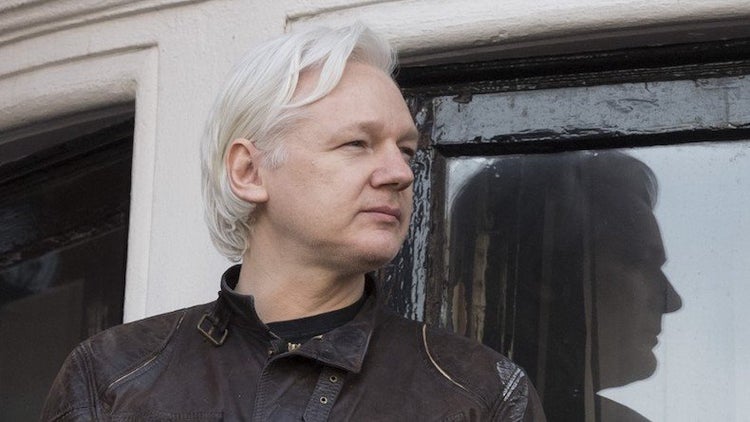
What ensues is tantamount to real institutional violence and a form of torture on us, the spectators of the show. As if the system wanted to tell us « you don’t believe he’s alive, you accuse us of making him die? Well look at him now! « The screen shows us a man who doesn’t react because he doesn’t know that he is being watched from the room because the video is turned off on the side of the room where he is. Julian Assange is shown to us like an animal in a cage. And we are forced, as his relatives and supporters, to observe him without his knowledge. We are obscenely put in a similar place to the employees of Rafael Correa’s security company who have watched Julian Assange for years in the places of his captivity, on Hans Crescent Street – that strange building in which the premises rented by Ecuador since 1976 have been adjoined since then by those of Colombia, whose proud flag is hoisted on the twin balcony of the one where Julian Assange sometimes appeared to the public from July 2012 to May 2017.
I quickly feel embarrassed and I feel how much this constrained show is humiliating for him and disturbing for us, all the more so as it lasts at least a quarter of an hour. It’s so long that we come to wish they would shorten this voyeurism when we had so much wished to see Julian Assange alive. But to see him alive is to see him worthy, to see him interact with the audience, to see him express himself, to grasp words he could have intended for us, the public, since since October 21st he knows we are here. I had not crossed, but I had grasped his gaze, I had encouraged him with my gaze and my attitude to give us information and I had tried to comfort him with my facial expression, with the few authorized gestures. I wasn’t the only one. Some people cried when they saw him and he saw our emotion and understood that he was no longer alone. This morning the system decided to tell us « Look at him well. He is ours » and send us back to our helplessness.
Indeed, I no longer have the impression of being in front of the same man whose dark and sad but determined eyes fixed my face on October 21st during the short break. You would have thought he was asleep, or drugged, so much his gestures are slowed down, he seems to be absent, his gaze vague. He is wearing a grey sweatshirt and beige trousers, you can’t tell on the video if he has a beard or if he is shaved. The camera is fixed a little high up and zooms in on his head, giving the impression that his head is bald. He quickly takes his glasses out of his pocket and puts them on and then we can no longer see his eyes. On 21 October he had given up the idea of putting them on as if they were useless while he was interacting with the audience and the lawyers. We do not understand why he wears them when he cannot see anyone and has no documents on the table in front of him or in his hand. I do however recognise the same round face and the chin a little tight backwards as when one clenches the jaw with force. So we look at him but it is a real torture to see him and to know that we can’t tell him anything and that he can’t communicate with us, give us a message.
At one point he puts his leg on his knee in a familiar gesture, and crosses his hands on his knees but he will not make any other gestures, remaining motionless and indifferent to events. We think we see again the sickly man we were introduced to on October 11th. This show lasts so long that in the middle Julian Assange even dozes off, leaning back, as if exhausted. When the judge appears, he keeps his eyes downcast and that passive gaze. I am so sad because I feel that he is worse off than when we last met. I look at John Shipton sideways, he remains impassive but I am sure that he can only suffer in the face of this spectacle of suffering. However the young men in front of us don’t seem to understand that they are watching the torture inflicted on a man. As for the others, they are visibly distracted chatting.
The secretary announces the arrival of the judge and tells us to stand up. It is judge Baraitser who appears on the platform while two other people enter the room through the judges’ door. Impossible to understand who they are and everything goes very fast then. Baraitser asks Julian Assange to introduce himself. He does so in a lower voice than usual, hesitant too, but to the end of a line. « Julian Assange, July 3, 1971 ». Unfortunately that is all our friend, a political prisoner, will say. He will neither greet his lawyer, nor the court, nor pass anything on to the supporters. Nor will he react to anything. I find it hard to recognise the same man who wanted to talk so much, at the cost of superhuman efforts on 21 October. Have they intimidated him since then? Is he worse off than October 21st? Does he really have video access to what is going on in the courtroom? We would like the court to provide us with proof of this. It is not forbidden to interact with the court. I have seen Polish detainees greeting and thanking their lawyers and interpreters and even unwinding elements of their own defence in addition to the lawyers, in the same room during the hearings on 11 and 18 October.
Judge Baraitser tells him that he is here because the 28 days of legal detention have passed. It is not she who will remind him that the detention is provisional, that it must be reviewed and that this is therefore an opportunity to put forward new arguments for a request for release. This is the role of the lawyer and the judge turns to Gareth Peirce to ask her if she has a motion to file. Julian Assange’s lawyer stands up and in a tired voice explains that they are working very hard on this file (Julian Assange witnesses these words without a gesture, his face keeps the absent, sad and resigned expression of the beginning of the hearing) but that it is impossible to prepare a defence without an appropriate computer to which his client does not have access in Belmarsh. The following sentences are all related to this computer request. The lawyer does not discuss an application for release, even on bail, or her client’s state of health. It is however visible to the public that it is Julian Assange’s worrisome state of health that prevents him from being effective in his defence. Here again, it seems surreal to me to see lawyers deploring the consequences of the illegal solitary confinement that Julian Assange is undergoing without being outraged by this psychological torture that has been denounced so many times and, above all, without quickly implementing all possible tools to put an end to it. We have since understood that our numerous letters are not delivered to him, even though the prison has received them by registered mail.
Mrs Peirce’s speech is delivered in a soft voice. Mrs. Baraitser smiled at her and quietly replied that computers in prison are not her responsibility and that she would do better to contact the relevant authority. I feel the humiliation of this disturbing scene: a young judge looks down on a 79-year-old tenor of the bar, a person considered THE figure of the English left in the field of law, and tells her that she is in the wrong procedure! If I were English, I would be mortified. As a left-wing European, I am very worried about the turn Julian Assange’s trial is taking because its consequences will affect us all. But here in the audience, nobody seems to care. Baraitser turns to the image on the video and announces two dates: 13 December video appearance for extension of detention and 19 December the important « case management hearing » with physical appearance. She does not ask the prisoner if he has understood and does not bother to give him the floor, unlike on 21 October, when she was in the public spotlight. The bailiff announces her departure and while we get up the video system makes the image of Julian Assange disappear.
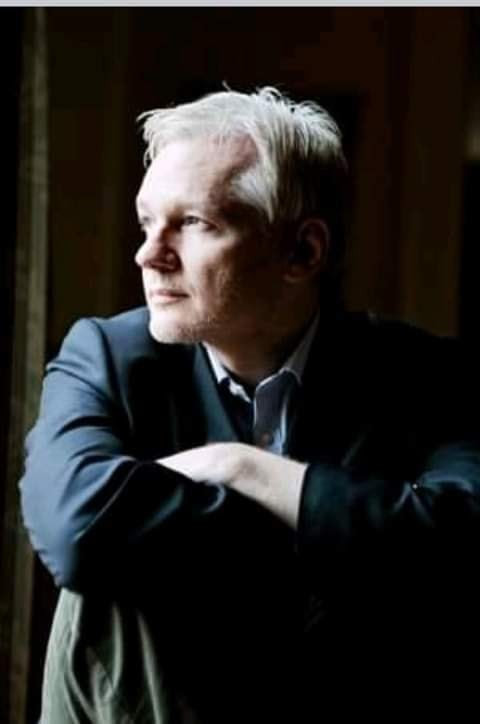
We remain in the corridor helpless, trying to evacuate the violent emotions we have experienced. Most of the « ten » in the room come out of the courtroom to join the demonstrators and respond to the journalists. John Shipton talks in a corner of the courtroom with Gareth Peirce and then leaves the courtroom preceded by Naomi Colvin, who pushes people to ensure that he gets through without having to be in the crowd, as if he were at least a minister. Two women who were present on October 21st come to tell me their astonishment and anger at the passive behaviour of Julian Assange’s lawyer. The revelations about Mark Summers’ conflict of interest in defending American interests in the Browder-Magnitsky [2]case did not escape them. Even if it is legal in the British system to defend the interests of both the accuser and the accused within the same law firm, for these left-wing activists the doubt about the integrity of the defence is cast aside. And we had not yet heard the news of Gareth Peirce’s collaboration with Rand Paul[3], a libertarian senator who is rather anti-alarmist… We finally understood that the public silence of the lawyers for months meant the application of the « strategy of collusion »[4], shifting all the strength of the response to the days of the fateful hearings in February. But if this strategy fails, then the public will be banned from the court, located inside the prison, which has even less room for « relatives »? The lawyers will be able to say, and those who strongly support this strategy of silence will be able to say: « Too bad, next time we’ll do better ». Except that there won’t be a second Julian Assange. The only Julian Assange who exists will have died in Guantanamo or in a psychiatric hospital in a US prison.
What energy does it take to break down his walls of violence, indifference and incomprehension?
[1] https://www.dailymaverivck.co.za/article/2019-11-15-conflicts-of-interest-judge-in-julian-assange-case-fails-to-declare-sons-links-to-uk-and-us-intelligence/amp/?__twitter_impression=true
[2] https://blogs.mediapart.fr/edition/liberez-assange-ethiques-et-medias/article/201119/avocats-d-assange-le-scandale-des-conflits-d-interets-se-repand-j
[3] https://blogs.mediapart.fr/edition/liberez-assange-ethiques-et-medias/article/201119/avocats-d-assange-le-scandale-des-conflits-d-interets-se-repand-j
[4] https://www.initiative-communiste.fr/articles/international/julian-assange-blanchi-mais-embastille-et-menace-a-besoin-detre-defendu/